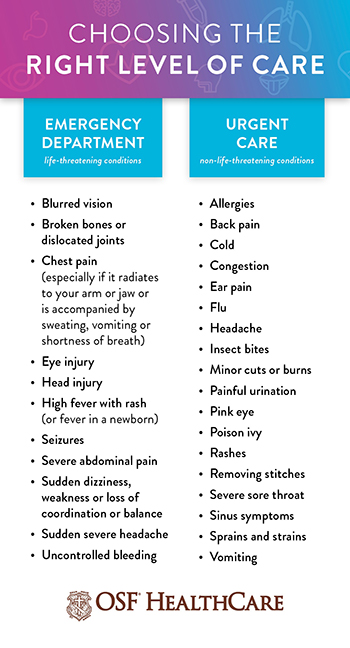
Emergency room or urgent care: Where should you go?
When you or someone in your family are injured or are feeling ill, deciding what type of medical care to seek is a decision you want to make quickly.
But going straight to the emergency room may not be the best option.
Urgent care clinic options, such as OSF PromptCare, OSF Orthopedics Walk-in Clinic and OSF OnCall Urgent Care, which has walk-in clinics and virtual visits, may be a better choice.
OSF also offers immediate connections through Clare, our digital assistant, that can be found at osfhealthcare.org. Clare can assist in helping you determine the proper level of care you need.
Emergency room or urgent care?
“If you believe you have a life-threatening injury or illness, please call 9-1-1 or go to the nearest emergency room,” said Brandi Clark, vice president of On Demand Services at OSF HealthCare.
If you have a minor illness or injury, like a sprain or break, you can use an urgent care or orthopedic walk-in clinic, which will help reduce your wait times and get you help faster.
“The emergency room should be reserved for the most severe situations. The emergency room triages patients based on the severity of their illness or injury and shouldn’t be used for non-life-threatening issues,” Brandi said.
Megan Brennan, director of Hospitalist, Emergency and Diagnostic Medicine at OSF HealthCare agrees, and said people should use their best judgment.
“If you’re experiencing mild, or longstanding symptoms, consider an urgent care clinic. If it is something that could be life or limb threatening, go to the emergency room,” she said.
Megan added some examples of when to go to the emergency room:
- Chest pain
- Shortness of breath
- Weakness, especially if it’s severe
- If you have a complicated medical history
Your Options for On-Demand Care
Brandi explains that OSF HealthCare has created care options – such as OSF PromptCare, OSF Orthopedics Walk-in Clinic and OSF OnCall Urgent Care walk-in clinics and virtual visits – to better meet the needs people have today.
“OSF has responded to changes in patient preferences to have more on-demand care options and locations for convenience and speed,” she said. “These are lower cost options to serve those with minor care concerns.
“We know the wants and needs of patients as it relates to health care are changing. The development of our new urgent care model – OSF OnCall Urgent Care – was a response to the ever-changing health care environment,” she said. “Offering options reflects the commitment OSF HealthCare has to meet individuals where they are in their health care journey.”
What are the benefits of urgent care?
Brandi suggests that urgent care is a better option for non-emergency issues for several reasons.
“First, a patient’s out-of-pocket costs are much lower,” she said. “Second, you can expect to experience significantly shorter wait times.”
It is not uncommon for patients with non-emergency issues to experience a wait in an Emergency Department as providers respond to life-threatening needs of other emergency patients first. But you can expect to complete an urgent care visit at an OSF OnCall Urgent Care, for example, within approximately 30 minutes.
Megan agrees that cost and wait times are significant benefits in seeking care at an urgent care clinic instead of a hospital.
In addition, she said seeking care outside of the Emergency Department lessens a patient’s potential exposure to more sick people and urgent care clinics offer more convenient locations and hours.
Getting treatment
The Emergency Department is the best place for treating severe and life-threatening conditions such as:
- Chest pain (especially if it radiates to your arm or jaw or is accompanied by sweating, vomiting or shortness of breath)
- Blurred vision, sudden dizziness, weakness or loss of coordination or balance, sudden severe headache
- Head or eye injuriesHigh fever with rash (or fever in a newborn)
- Seizures
- Severe abdominal pain
- Uncontrolled bleeding
Urgent care clinics – such as OSF PromptCare, OSF OnCall Urgent Care and OSF Orthopedics Walk-in Clinic – offer extended hours for walk-in visits and virtual visits. They can be used if your condition isn’t life-threatening but needs to be taken care of right away. Conditions that can be treated include:
- Allergies
- COVID-19 symptoms requiring testing
- Cold or flu symptoms
- Earaches
- Fevers
- Foreign object in eye or nose
- Headaches
- Insect bites
- Minor allergic reactions
- Minor burns or bruises
- Minor fractures
- Rash or poison ivy
- Scrapes or minor cuts
- Skin complaints
- Sore throats
- Sprains or breaks
- Sutures
- Urinary tract infections (UTI)
- Upper respiratory infections
Still not sure?
Both Brandi and Megan point out that OSF HealthCare has other ways to help patients determine the level of care they need.
OSF OnCall Urgent Care virtual visits provide 24/7 health care through your computer, tablet or smartphone. A board-certified provider can diagnose and recommend treatment for a variety of minor illnesses and injuries.
And don’t forget about digital tools like Clare which are available 24/7.
“Clare is designed to ensure patients are directed to the most appropriate care setting,” Brandi said.
Simply click on the photo of Clare in the lower right corner at osfhealthcare.org and she will prompt you through a series of questions to determine where to direct you for care.
Find care near you
To find an urgent care clinic near you, click here. And always, if it’s an emergency, call 9-1-1.
